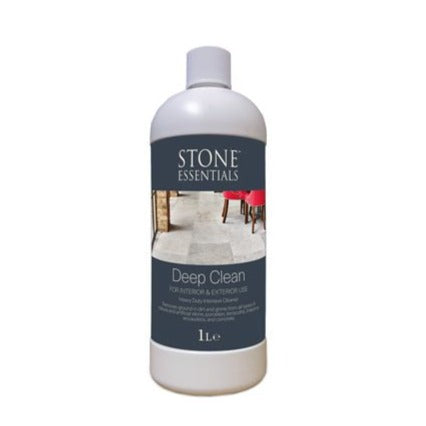Application
Application form

Outdoor tiles can add elegance, style, and functionality to your outdoor spaces and the possibilities for their use are (almost) endless. We're talking patios, decks, garden paths, uber-chic outdoor kitchens, and anything else your heart desires. Let's be honest, they look amazing and set an impressive tone for your outdoors. However, being outside can take its toll; exposure to the elements can mean a hefty accumulation of dirt, grime, and stains over time if you're not on top of your maintenance game.
But never fear! We have a particular set of skills; skills we have acquired over a very long career. Skills that make us very knowledgeable about tiles. Which means we have collated what you need to know about keeping your outdoor beauties youthful and magnificent for as long as you shall want them. Yes, outdoor porcelain tiles are easy to upkeep and really don't take much time, but 'little and often' is definitely the catchphrase here.
So, without further ado, here's our guide on how to clean and care for your outdoor tiles. And we'll even answer some questions too.
When it comes to cleaning outdoor tiles, whether they are porcelain tiles or ceramic outdoor tiles, it's essential to choose the right cleaning solution to effectively remove dirt and stains without damaging the surface. Most of our outdoor tiles are glazed, meaning there's a barrier between the actual tile material and any dirt, making them easier to clean. A bit like a Scotchguard effect.
With that in mind, we would recommend the following garden tiles cleaning options:
A. Mild washing up liquid and warm water: A solution of mild washing up liquid and warm water is gentle and effective enough for routine cleaning. Mix a few drops of washing up liquid in a bucket of warm water, apply it to the tiles using a soft brush or mop, scrub gently, and rinse thoroughly. For light soiling, this is great. But, if this doesn't cut the mustard, proceed to option B.
B. Ca' Pietra All Clean: This little gem is suitable for natural stone tiles (sealed and unsealed varieties), porcelain tiles, and ceramic tiles. And is great for exterior tiles as well as interior ones. All you need to do is dilute 1 capful of All Clean per litre of warm water, mop your outdoor tiles with the solution, and allow to dry. No rinsing required. All Clean is especially great because it's tough on stains, but gentle on your grout to leave your tiles securely intact. And we love it.

If you want to know more, here is the All Clean data sheet.
C. Now for the nuclear option. Hey, we've all been there with grease stains, oil and ground in dirt, so no judgement here. But if you find yourself in the stains-that-just-won't-budge predicament, Ca' Pietra Deep Clean is your dude. A great heavy-duty, intensive cleaner, this tile cleaning solution is suitable for all types of tile, including terracotta tiles. Simply dilute according to the severity of the stain, apply over your surface, rub with a stiff brush and leave to react for 5-10 mins. Rub again with the brush, mop and then rinse thoroughly.
The above are nutshell instructions. For more information specific to your situation, here's the Deep Clean instructions sheet.
While the above cleaning methods work wonders, some lesser morsels can others can damage your outdoor tiles. So, here's a list of products you should definitely avoid:
A. Abrasive cleaners: Harsh cleaners, scouring powders, and steel wool can scratch and dull the surface of your tiles. There's not much worse than having your lovely, newly-new tiles damaged by these offenders, so please don't be tempted; no matter how stubborn the stain, it's just not worth it.
B. Bleach and ammonia: This criminal double act is to blame for many a tile discolouration. Usually too harsh, especially for natural stone, avoid at all costs. Unless specifically recommended by the tile manufacturer.
c. Pressure washers: Now this one is a tricky little beast. While we wouldn't recommend them for ceramic outdoor tiles, delicate types of natural stone, or any installation featuring brush in grout, 20mm porcelain pavers are good under pressure.
As long as you use on 20mm porcelain tiles with caution, making sure not to concentrate an intense stream of water in one area, or on the grout lines, using a pressure washer can be a quick and effective way of keeping your porcelain clean.
How often you clean your outdoor tiles depends on various factors such as where they are, how often they're walked on, and weather conditions. Generally, it's recommended to:
A. Sweep or brush your tiles regularly to remove loose dirt, leaves, and debris.
B. Perform a light clean once a month or as needed during the warmer months, and a more thorough clean in autumn and winter. This is just to make sure you don't get any horrible stains from the adverse weather and decomposing leaves. This should be enough to ensure your outdoor tiles are ready for alfresco dining and hi-jinks when you need them.
C. Keep an eye out for signs of mould, mildew, or stubborn stains and address them promptly to prevent them from becoming harder to remove.
So, there you have it; our guide to cleaning and maintaining your outdoor tiles. As always, if you choose to use any products, please follow the manufacturer's instructions and test on an inconspicuous part of your tile installation first. Then sit back, relax, and enjoy your outdoor space with pride. Or pizza. You do you.
{"one"=>"Select 2 or 3 items to compare", "other"=>"{{ count }} of 3 items selected"}

